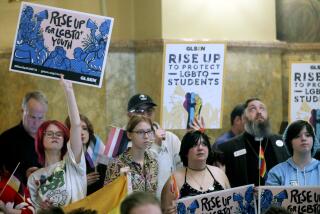Justices to consider timing of discrimination lawsuits
WASHINGTON — The Supreme Court plunged back into the legal fight over firefighters, test scores and accusations of racial discrimination Wednesday, this time to decide when those who say they were victims of discrimination must file a lawsuit.
In June, the justices ruled for white firefighters in New Haven, Conn., who were denied promotions after they earned top scores on an exam. Justice Sonia Sotomayor was sharply criticized during her Senate hearing because, as a judge, she had ruled against the white plaintiffs.
Now the court will hear an appeal from black applicants who said that Chicago’s test for firefighters discriminated against them. However, the issue is one of timing and procedure: Was it necessary for the plaintiffs to file a discrimination suit shortly after the test was given? Or could they wait until later, after the results were used to hire new firefighters?
The justices also agreed to clarify part of the anti-terrorism law and to decide whether human rights activists in the U.S. can be prosecuted for giving “expert advice” or political training to a group like the Kurdistan Workers Party in Turkey, which the U.S. has designated a terrorist organization.
That case grew out of an 11-year legal battle in Los Angeles over a law that makes it a crime to provide expert advice and other material support to a terrorist group. Since 2001, the government has convicted several men under the law for undergoing training with Al Qaeda in Afghanistan.
Earlier this year, the U.S. 9th Circuit Court of Appeals struck down parts of the anti-terrorism law because its references to “expert advice” or “training” could include a lecture on how to resolve disputes peacefully.
“We don’t make the country safer by criminalizing those who advocate nonviolent means . . . or by making it a crime for a human rights group in the U.S. to provide human rights training,” said Georgetown University law professor David Cole, who represented the challengers.
But U.S. Solicitor General Elena Kagan persuaded the Supreme Court to review the ruling. She said that the government needed broad power to prosecute those who knowingly helped a terrorist group, regardless of their motives.
The case is Holder vs. Humanitarian Law Project.
The Chicago firefighters’ case concerns the same civil rights issue that gained so much attention during the summer. It is illegal for employers to use a test that has a “disparate impact” on minorities, unless it can be justified as a business necessity.
Four years ago, a federal judge in Chicago ruled that the city had discriminated against black candidates because its test in the mid-1990s had an unfair and disparate impact on minorities. White test-takers were five times more likely than their black counterparts to qualify for firefighting jobs, the judge found.
But last year, the U.S. 7th Circuit Court of Appeals overturned the ruling and threw out the suit because the black applicants had waited more than a year to challenge the test results. “That was a fatal mistake,” wrote Judge Richard Posner. The federal civil rights law says suits must be filed within 300 days of an unlawful employment practice.
The court also agreed to hear several other new cases, including one on whether the Miranda rule is triggered when a suspect voluntary talks to the police and another on whether Public Health Service doctors can be sued personally for providing negligent medical care to immigrants in custody.
--
More to Read
Get the L.A. Times Politics newsletter
Deeply reported insights into legislation, politics and policy from Sacramento, Washington and beyond. In your inbox three times per week.
You may occasionally receive promotional content from the Los Angeles Times.










